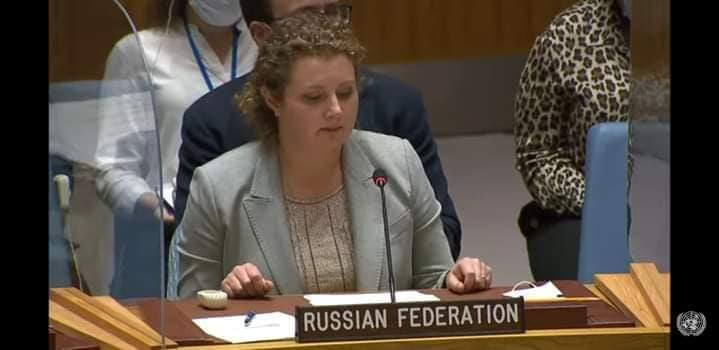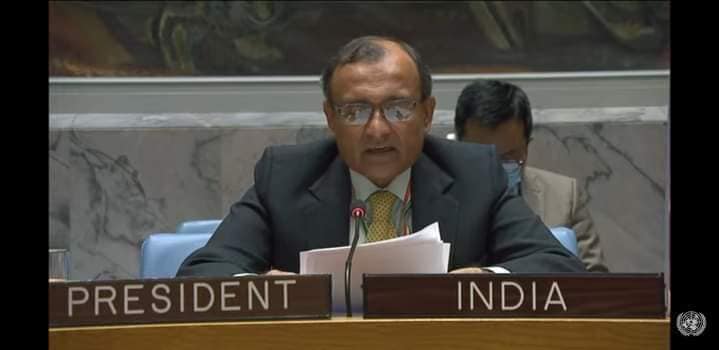 Addis Ababa August 27, 2013 (Walta) – Member States of the UN Security Council (UNSC) said international humanitarian agencies and countries should uphold the UN guiding principles on humanitarian assistance and respect the sovereignty of the country while carrying out their work in Ethiopia.
Addis Ababa August 27, 2013 (Walta) – Member States of the UN Security Council (UNSC) said international humanitarian agencies and countries should uphold the UN guiding principles on humanitarian assistance and respect the sovereignty of the country while carrying out their work in Ethiopia.
During a discussion held at the United Nations Security Council on Thursday, Permanent Representative of China to the United Nations, Ambassador Dai Bing said his country welcomed the Ethiopian Government’s recent efforts in alleviating the humanitarian situation in Tigray and neighboring areas.

In the meantime, due to conflicts, the humanitarian situation in relevant Ethiopian regional states has become increasingly grave, and humanitarian needs in Amhara and Afar have increased, he underscored.
He said, “International humanitarian agencies while carrying out their work, should uphold the UN guiding principles on humanitarian assistance and respect the sovereignty of Ethiopia.”
Furthermore, he noted China firmly supports Ethiopia’s efforts in safeguarding national sovereignty and unity and will continue to support the Ethiopian people in achieving national peace, stability, development, and prosperity.
“We hope all parties in Ethiopia will resolve conflicts and differences through political dialogue, ease tensions and avoid further escalation of conflict, so as to create conditions for achieving peace and reconciliation,” he underlined.
The Representative reiterated that China opposes interference by external forces in Ethiopia’s internal affairs in the name of human rights and humanitarian matters.
“We support the AU and the regional countries to resolve African issues in the African way and welcome the appointment of the former President of Nigeria Mr. Obasanjo as the AU High Representative for the Horn of Africa. We hope the UN and AU will strengthen their collaboration and jointly play a constructive role in promoting reconciliation among all Ethiopian parties through dialogue,” said Ambassador Bing.
Bing said “The unilateral sanctions imposed by individual countries on Ethiopia are inconsistent with international law and the basic norms of international relations. Instead of resolving conflicts, they will only interfere with the political settlement.”
He assured that China believes the Ethiopian Government has the ability and wisdom to handle its internal affairs well and firmly believes the Ethiopian people can overcome difficulties and tackle the current challenges.
China stands ready to work along with the international community to support Ethiopia’s commitment to national unity, restoration of stability, and achievement of development, he reaffirmed.
Deputy Permanent Representative of Russia at UNSC, Anna Evstigneeva said on her part “We regret the failure of the initiative to establish unilateral humanitarian ceasefire that Addis Ababa announced at the end of June.”

Units from the TPLF proceed with hostilities, having established control over a number of areas not only in Tigray but also in the neighboring Afar and Amhara regions that have not been previously touched by conflict, she stated.
Evstigneeva noted, “we are particularly concerned by the attempts of TPLF to curb humanitarian delivery routes, in particular, to impose control over the strategic route linking Ethiopia and Djibouti, which threatens to further exacerbate the already complex humanitarian situation and boost the flow of refugees and IDPs.”
The humanitarian situation in the region remains truly complicated she said, adding “Thereby, Federal Government continuously contributes to its improvement. We welcome the efforts of Ethiopian authorities that unblocked a WFP humanitarian convoy in Semera recently.”
She stressed the need for considering the situation as a humanitarian issue saying “we are convinced that in order to improve the situation, we first of all need to depoliticize northern Ethiopia’s humanitarian file.”
Humanitarian assistance has few chances to be a success amidst the ongoing political confrontation and toxic vibes spreading in the Mass Media, she underlined. Neither can we agree to the artificial shift of focus of the work of humanitarians to Tigray.
She called on international humanitarian agencies and countries to consider all areas that are in need of assistance and respect the sovereignty and territorial integrity of Ethiopia.
Evstigneeva stressed that when rendering humanitarian assistance, it is essential that equal attention also be given to other regions, including Amhara, Oromia, and Somalia that experience considerable humanitarian needs, related to conflict and natural disasters.
“Such efforts should be based on UNGA resolution 46/182 and UN fundamental guiding principles of humanitarian assistance. We call on OCHA to pay specific attention to maintaining a trustful and constructive dialogue with the Federal Government,” the Representative said.
Noting that Russia supports the work of the Secretary-General to ensure a political dialogue, the Representative said “We are convinced that this dialogue must be owned by the Ethiopian sides themselves, supported by the African community in the first place. Any prospective external assistance must be provided given full respect for sovereignty, territorial integrity and political independence of Ethiopia”.
Elaborating that the June elections in Ethiopia, proved the capability of federal authorities of consolidating the Ethiopian society, she emphasized that attempts to shatter the situation and exert pressure on the democratically elected government of Ethiopia, by adopting unilateral sanctions, pave the path towards the further proliferation of the conflict.
Permanent Representative of India to the United Nations, Ambassador T.S. Tirumurti appreciated the unilateral ceasefire announced by the Government of Ethiopia on 28 June 2021 saying it “was an important step, aimed at improving the worsening humanitarian situation”.

The Representative said, “in recent weeks, the conflict has intensified and now been spread by one side to the neighboring regions of Amhara and Afar”.
“Unfortunately, the opportunity provided by the ceasefire seems not to have been grasped, with the continuing aggression and belligerence of one side, and spread of fighting beyond Tigray region,” he said criticizing the move by the terrorist group.